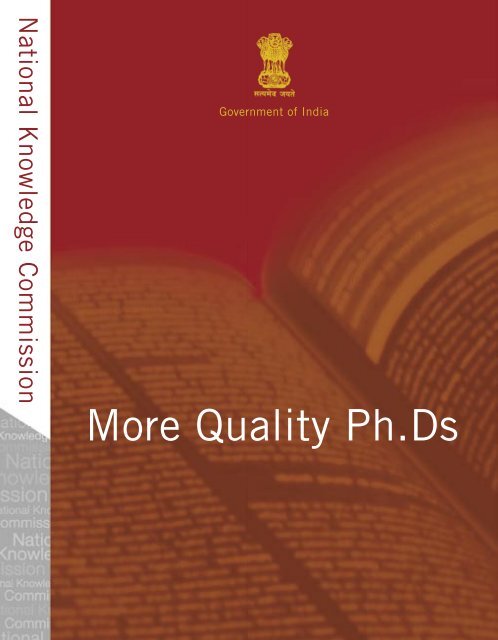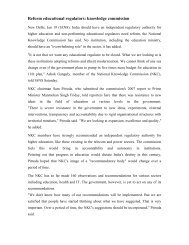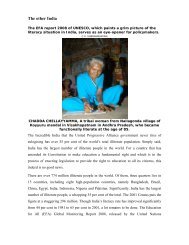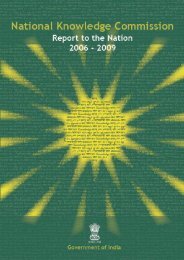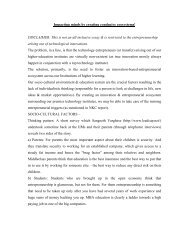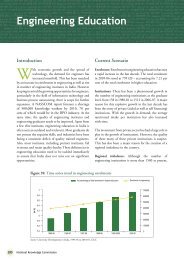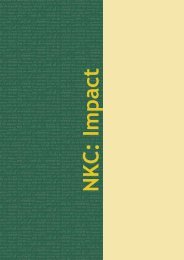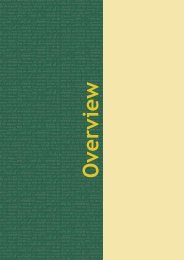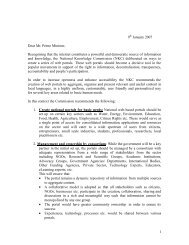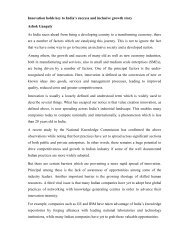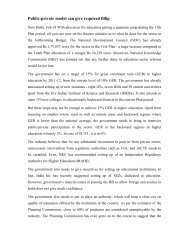More Quality Ph.Ds - National Knowledge Commission
More Quality Ph.Ds - National Knowledge Commission
More Quality Ph.Ds - National Knowledge Commission
- No tags were found...
Create successful ePaper yourself
Turn your PDF publications into a flip-book with our unique Google optimized e-Paper software.
© <strong>National</strong> <strong>Knowledge</strong> <strong>Commission</strong>, December 2008Published by:<strong>National</strong> <strong>Knowledge</strong> <strong>Commission</strong>Government of IndiaDharma Marg, Chanakyapuri, New Delhi-110 021www.knowledgecommission.gov.inCopyediting, design and printing:New Concept Information Systems Pvt. Ltd., New Delhi-110 076www.newconceptinfo.com
Foreword<strong>Quality</strong> research in India is fundamental for generating intellectual capital necessary tosurvive and sustain economic growth and prosperity in the competitive global markets.It is widely recognized that there is a severe shortage of people engaged in the academicand industrial research in the country. As India moves towards a knowledge society,reviving research culture in all established institutions of higher learning is necessary.High quality research in different areas of science and technology is critical toProductivity, Efficiency, <strong>Quality</strong>, Costs and new Products and Services for achieving longterm competitive advantage. In addition, domain expertise in all frontiers of knowledgeis essential for the overall progress of society as a whole.With this in mind, the <strong>National</strong> <strong>Knowledge</strong> <strong>Commission</strong> (NKC) conducted a wide-spreadsurvey across India and abroad seeking inputs on improving the research ecosystemin the country. The NKC submitted the letter and the note on ‘<strong>More</strong> <strong>Quality</strong> <strong>Ph</strong>.<strong>Ds</strong>’to the Prime Minister on 6 November 2008. The thrust of this is to call for massiveinvestment in education and research at all levels, together with a renovation and reformof the university system, and the fostering of a global outlook in research. We have alsorecommended a <strong>National</strong> Research Mission to be spearheaded by the proposed NSERB,which will undertake all the activities required to bring about long-term sustainablechanges in the research culture, thus targeting a continuous increase in the amount andquality of research undertaken in the country.In sharing our recommendations on <strong>More</strong> <strong>Quality</strong> <strong>Ph</strong>.<strong>Ds</strong> with diverse stakeholdersthrough this document, we envisage generating discussions and debates that willcatalyze implementation plans for a much needed change.Several of these recommendations have linkages with our recommendations in the areasof education, entrepreneurship, intellectual property rights, knowledge network andattracting talented students to Maths and Science, submitted earlier to the PM. We haveincluded the relevant highlights of the other recommendations. These suggestions shouldtherefore be seen as part of a systematic set of knowledge initiatives for the future.Sam PitrodaChairman<strong>National</strong> <strong>Knowledge</strong> <strong>Commission</strong>
AcknowledgementsI am grateful to everyone who was generous with their time and energy to participatein our endeavour.In particular, I would like to thank all the people who took time out of their busyschedules to answer our surveys and shared their ideas on how we could effectivelytackle the challenge of augmenting quality research activities in the country. Inaddition, I am grateful to all the participants of the workshop held at Delhi.It is a pleasure to thank the other Members of the NKC and Sunil Bahri, ExecutiveDirector, NKC, for valuable comments and suggestions. Thanks are also due tothe support of the NKC staff. Finally, Pratibha Bajaj, Namita Dalmia and VikasBagri, Research Associates with the NKC did a tremendous job with the backgroundresearch and coordination. I warmly thank them for their efforts and help.Dr. Sujatha RamdoraiMember, <strong>National</strong> <strong>Knowledge</strong> <strong>Commission</strong>ContentsMethodology 3NKC Snapshot 4Letter to the Prime Minister 5Note on <strong>More</strong> <strong>Quality</strong> <strong>Ph</strong>.<strong>Ds</strong> 11Part A: Attracting potential doctoral students 12Part B: <strong>Quality</strong> 21Part C: Nurturing a research environment 25Part D: Fostering a global outlook in research 37AnnexuresConsultations 42Highlights of Other Recommendations 43
3Methodology• Identification of key focus areas• Identification of diverse stakeholders and understanding major issues• Constitution of Working Groups and organizing of workshops/seminars, extensiveconsultations with concerned experts and stakeholders• Consultation with administrative Ministries & the Planning <strong>Commission</strong>• Discussion in NKC to finalize recommendations in the form of letter to the PM fromthe Chairman• Letter to PM containing key recommendations, first steps, financial implicationsetc. supported by the relevant explanatory documents by NKC• Dissemination of recommendations to state governments, civil society and otherstakeholders• Initiating the implementation of the recommendations under the aegis of the PrimeMinister’s Office• Coordinating and following up implementation of proposalsWorking GroupsLibraries, Language, Agriculture,Health Information Network,Undergraduate Education, MedicalEducation, Legal Education,Management Education,Engineering Education, TraditionalHealth Systems, <strong>More</strong> Studentsin Maths and Science, Openand Distance Education, Using<strong>Knowledge</strong> for Enhancing <strong>Quality</strong>of LifeWorkshops/SeminarsLiteracy, Translation, Networks, School Education, MuslimEducation, Vocational Education, Open and DistanceEducation, Intellectual Property Rights, Science andTechnology, Agriculture, Open Education Resources, Portals,<strong>Quality</strong> of Life, <strong>More</strong> <strong>Quality</strong> <strong>Ph</strong>.<strong>Ds</strong>SurveysInnovation, Health Information Network, Traditional HealthSystems Entrepreneurship, <strong>More</strong> <strong>Quality</strong> <strong>Ph</strong>.<strong>Ds</strong><strong>More</strong> <strong>Quality</strong> <strong>Ph</strong>.<strong>Ds</strong>
NKC Snapshot• Libraries• Health Information NetworkRecommendations submitted in 2006• Translation• English Language Teaching• <strong>National</strong> <strong>Knowledge</strong>Network• Right to Education• Vocational Education &Training• Higher Education• <strong>National</strong> Science andSocial Science Foundation• E-governanceRecommendations submitted in 2007• Portals• Open Educational Resources• Legal Education• Medical Education• Management Education• Open and Distance Education• Intellectual Property Rights• Innovation• Traditional Health Systems• Legal Framework for PublicFunded ResearchRecommendations submitted in 2008• School Education• Engineering Education• <strong>More</strong> Students in Mathsand Science• Entrepreneurship• <strong>More</strong> <strong>Quality</strong> <strong>Ph</strong>.<strong>Ds</strong>Portals Launched• Energy• Water• Environment• TeachersWorks in Process• Portals (Biodiversity, Health)• <strong>Knowledge</strong> Applications inAgriculture• Enhancing <strong>Quality</strong> of Life4
• Enhancing the prestige, social-standing and remuneration of people in the academicprofession• Systematic and targeted initiatives to unleash the potential of gifted studentsoutside the urban population centres• Utilisation of current technology to provide greater access to quality learning at alllevels, and bridging the language gap• Increased coverage in the media of different facets of teaching, research andacademic achievements, both nationally and internationally2. Initiate major academic reforms in universitiesThroughout the world, universities are the natural home for the interface between teachingand research. But this is far from reality in the vast majority of Indian universities. Infact, the overall current situation in Indian universities is dismal largely due to thelack of quality infrastructure and the inability to recruit good young faculty and giftedstudents. Some concrete interventions for improving the situation include:-• Urgent Regulatory reforms in Higher Education, reducing regulation while improvinggovernance; the details have been articulated by NKC in its earlier recommendationson Higher Education• Greater autonomy for departments within universities to introduce new relevant courses,along with encouragement and rewards for innovation in teaching and research• Identifying and supporting university departments as Centres of Excellence• Greater flexibility and increased funding for university departments to recruit andretain good faculty from across the world• Periodic peer reviews of departments in the universities• Encouraging recruitment of capable and talented younger faculty3. Implement administrative reforms in universitiesIt is equally important that reforms in the administration of universities accompanyacademic reforms. This will ensure professional administration of universities, and helpin attracting students and good faculty. These reforms should include the following:-• Ensuring a capable administration headed by an able Vice Chancellor and Registrar;these appointments should be based on academic and administrative credentials6
• Creating joint <strong>Ph</strong>.D programs between universities both within and outside ofthe country• Financial and administrative support for international research collaborations• Identifying important areas of research where national expertise needs to be developedand initiating steps for funding and capacity building by way of collaborations,guest faculty, pro-active hiring, etc.In conclusion, it must be recognized that investment in education and research producesa broad range of dividends, both tangible and intangible. Our existing base in researchneeds to be urgently strengthened to arrest any further erosion. While the NKC welcomesthe augmented allocation for education in the Eleventh-Five Year Plan, it is important thatthese funds are effectively utilized to make a visible difference in our academic landscape.As a first step, we urge the government to set itself a target of tripling the existing researchbase within the next dozen years, and meaningfully work towards it. We strongly feel that amission oriented approach is necessary for creating the required research ecosystem in thecountry. Hence, we recommend a <strong>National</strong> Research Mission which can be spearheadedby <strong>National</strong> Science and Engineering Research Board, proposed in the current Five YearPlan. We reiterate that implementing these recommendations can invigorate the nation’sintellectual and academic environment, and the NKC hopes that the Government willimmediately begin work on these vital national issues.Thank you and Warm Personal Regards,Yours sincerely,Sam PitrodaDr. Manmohan Singh,Hon’ble Prime Minister of IndiaCC: Dr. Montek Singh Ahluwalia, Deputy Chairman, Planning <strong>Commission</strong>Sh. Arjun Singh, Minister, Human Resource DevelopmentSh. Kapil Sibal, Minister, Science and Technology10
Note on <strong>More</strong> <strong>Quality</strong> <strong>Ph</strong>.<strong>Ds</strong>11Research is an activity based on intellectual investigation and has the purpose ofdiscovering, interpreting, and revising human knowledge and experience on variousaspects of life. It is crucial for the overall development of human society. As the economicparadigm undergoes a change in the globalized world, future economic progress willincreasingly be a function of the intellectual capital that a nation can create. This inturn depends crucially on the quality of academic research that is done in the nation.Thus, if India is to play a key role in the envisaged <strong>Knowledge</strong> Economy of the world,a significant investment in research, accompanied by sustained vision and policy isvital to achieve a long term competitive advantage. While the importance of researchand development in science and technology is increasingly recognized, basic researchin many other areas like economics, management, social sciences, arts, etc play anequally important role in the overall development and well-being of a nation.Historically, India has had an enviable standing in the world of research. However, thecurrent situation is unsatisfactory across multiple dimensions, and the reasons for thisare manifold. An important factor which impacts the quality and quantum of researchis the scarcity of talented and dedicated manpower engaged in research. We needqualified doctorates for our research laboratories, to teach and engage in research inour universities and to work for research and development in all sectors of the industry.The number of researchers in India was 112 per million inhabitants compared to 633 inChina and 4374 in USA in 2002. The growth in the number of doctorates has been onlya modest 20% in India from 1991-2001 compared to 85% in China during the sameperiod. 1 The current state of affairs thus requires urgent policy intervention.Research in any area requires continuous intellectual engagement along with a passionfor ideas and creative thinking. We thus need to create a system where these qualitiesare nurtured and encouraged, thereby providing a pool of students wishing to pursuedoctoral studies. Simultaneously, it must be ensured that once they acquire a <strong>Ph</strong>.D,1“Measures of Progress of Science in India”, Report by NISTADS 2006<strong>More</strong> <strong>Quality</strong> <strong>Ph</strong>.<strong>Ds</strong>
further employment opportunities are attractive. This is essential to justify the amountof time and effort invested in doctoral research, even more so in today’s modern worldwhere there are many other seemingly easier and more lucrative career options. Whileachieving a critical mass of researchers in the country is important, it is necessary toensure that quality standards are maintained at the same time.With this objective, NKC initially conducted a wide spread survey across the countryand abroad. A detailed questionnaire was sent to all the universities, academic andresearch institutions, government agencies, and other stakeholders. <strong>More</strong> than 250people responded to the survey. A one day workshop was also held where prominentmembers from diverse industries, academic and research institutions and universitiesdeliberated on these issues. A list of participants is attached in the annexure. Thisnote captures the main suggestions that evolved from these consultations. Some of therecommendations below have systemic linkages to the previous NKC recommendationsin the areas of education, entrepreneurship, intellectual property rights, knowledgenetwork and attracting talented students to Maths and Science.Part A: Attracting potential doctoral studentsIn order to sustain research in the long term and for it to flourish, creating a criticalmass of researchers and academics is of the foremost importance. Serious policyinterventions are required to ensure that this is achieved within a specified time framein the country.Recommendation 1: Create greater awareness and acceptance towardspursuing teaching and research as a career, by communicating theopportunities and excitement at a broader levelIssues: The Indian society at large, especially the younger generation is not wellinformedof the career opportunities, excitement and freedom that a research careeroffers. Consequently, the acceptance level for embarking on such careers is rather low.Societal pressure affects career choices significantly. A multi pronged approach needsto be adopted to bring about a change in the national mindset towards recognition and12
13acceptance of a career in research. For long term wealth creation, it is important thatthe nation trains academics, scientists and teachers, rather than bankers.AwarenessMedia: The media has an important role to play in bringing about a fundamental changein attitude and in the nation’s consciousness on this issue.• Short and engaging television or radio programmes related to research can be airedat prime time.• News channels should highlight and publicize various achievements of academicsand other scientists.• Print and electronic media should be encouraged and incentivized towards promotionand engagement of the intellect.There are various other means to increase the awareness of society at large:• Annual R&D shows can be held, where leading research institutes and companiesinteract with the public, thereby providing a wider exposure.• Museums, exhibitions and popular lectures are other avenues through which publicattention can be engaged. These should be encouraged at as many places aspossible. For this purpose, the resources and infrastructure of various educationalinstitutions throughout the country should be used.• Academic societies should be generously funded and members should be encouragedto participate in the outreach programmes.• In schools and colleges, career awareness workshops and seminars highlightingresearch careers should be held regularly.• Important academic events and visits of reputed academics to India should bepublicized and shared with the entire educational community through the use ofvarious channels. This will help create enthusiasm in teachers, students and alsoacquaint society with academia.• Talent residing in rural areas remains completely untapped because of variousreasons. Basic education and learning resource materials should be made availableto all. At the same time, it is important that targeted initiatives be undertaken<strong>More</strong> <strong>Quality</strong> <strong>Ph</strong>.<strong>Ds</strong>
to identify talented students and to provide them with opportunities for greaterexposure, learning and bridging language gaps.• Women and especially their parents must be made aware of the possibilities andflexibilities that a research career offers, and should be encouraged through targetedinitiatives towards such a career path.Acceptance• Nobel Prize winners, reputed academics and other scientists should communicateand publicize the joy and opportunities in a research career.• School teachers play a very important role in orienting students as well as their parents.Hence teachers should be trained and engaged in this endeavour. Parent-TeacherAssociations provide a platform where role models can interact with both parents andteachers at the same time and increase their acceptance towards research.• Open competitions and projects at different levels should be conceptualized,encouraged and widely publicized. Industry can be involved in such activities.• Recognizing good research work is important for two reasons. It gives a sense ofpride to the researcher as well as encourages others to do research. Hence, variousmeans of recognition such as awards, felicitations, publicity etc should be taken upat all levels.• Higher learning, along with research and innovation, plays an important role indevelopment of knowledge areas. Its impact on society needs to be publicizedwidely.• Both the monetary and non-monetary aspects of a research career, especially theaccompanying academic freedom and the international nature of research, shouldbe communicated to students.Recommendation 2: Expose undergraduate and post graduate studentsto cutting edge research and engage them in serious research whereverpossibleIssues: The major decision points where a student decides to pursue doctoral studiesare towards the final year of either an undergraduate or a master’s programme. These14
15students are often not well exposed to various research opportunities and hence remainuntargeted.2.1 Undergraduate Research: A good undergraduate teaching programme is vital forgrooming prospective students towards research. Currently, our education systemremains largely unimaginative and monotonous with a stress on rote learning and withproblems handed down to students. Wide-ranging reforms that encompass pedagogyof teaching, curriculum and evaluation are a pre-requisite to nurture and encourageinterested students towards a research path 2 .• Relevance and application play an important role in attracting applied researchers,while general abstraction and challenge attract theoretical researchers. Taking thisinto account, a judicious mix of projects and courses may be designed, of which onekind offers an exposure to real life problems from the industry, economy etc. andanother imparts foundational training in theoretical aspects of the subject.• Courses that orient students towards research need to be specifically designedand made part of the curriculum. An important component of these coursesshould impart knowledge on identifying and defining problems, various researchmethodologies, analytic methods and presentation. Team projects comprising ofdifferent disciplines can be introduced as an optional course for students. Thiscould be combined with changes in syllabus that allow one research-based courseeven at undergraduate level.• Summer internships, summer schools, workshops, competitions should all beencouraged. Exciting undergraduate research projects that can involve larger numberof students should be rolled out. The vacation period should be utilized to provideundergraduate students with a comprehensive training comprising of exposure toproblems in rural areas, industrial training, research project in academic or researchinstitutions and an exposure to foreign universities through various means such asexchange programmes. DST, ICSSR and other organisations can fund a programmeof small research projects to be undertaken at undergraduate level, which wouldintroduce students to the actual practice of research.2See <strong>National</strong> <strong>Knowledge</strong> <strong>Commission</strong>’s recommendations on Higher Education,http://www.knowledgecommission.gov.in/recommendations/higher.asp<strong>More</strong> <strong>Quality</strong> <strong>Ph</strong>.<strong>Ds</strong>
• Teachers need to be trained to promote research and should be incentivized tocreate innovative projects where undergrads can participate.• Exposure to and acquaintance with frontier research should be facilitated.Overall, undergraduate education needs to be strengthened in the country. Creativityshould be encouraged at all levels. A continuum of quality institutions from theundergraduate level in all disciplines is required. Residential undergraduate programmesshould be increased.2.2 Post graduate research and training: To encourage research and innovation at postgraduate level, several measures can be undertaken.• Post graduate students should be given the opportunity of spending a semester atresearch labs or other Indian or foreign universities, outside their own universityto broaden exposure. The home universities should facilitate such exposure byentering into alliances with other well established places of research. The BITSPilani programme is an excellent example of such an initiative.• Research projects which have the potential to be extended as doctoral projects needto be encouraged at the post graduate level. Projects should be offered in emergingareas to retain student interest. Faculty must regularly update themselves to be ina position to guide students. Group research projects among post graduate studentswill create more interest and add enthusiasm towards research.• Reduction of course load with a corresponding increase in the research componentfor students who show deep interest and commitment to research would incitepotential doctoral students.• Post-graduate courses in Social Sciences and Humanities should have a component(perhaps a full course or paper) that requires either desk-based or field research,which could be an optional choice.• All post-graduate departments should organize and hold regular research seminars,and students should be encouraged to attend these. Programmes that facilitateestablishing links between interested post graduate students and their prospectiveguides should be encouraged.16
172.3 Integrated doctoral programmes: There should be flexibility of moving fromundergraduate degree to a <strong>Ph</strong>.D degree when substantial interest and aptitude forresearch has been shown at the undergraduate level by the student. S.N. Bose Centrefor Basic Sciences runs such a programme.An integrated programme covering bachelors, masters and doctorate degrees with variousexit points has multiple advantages. It will establish a vital link between students at alllevels. Networking among students at different levels will give rise to new ideas. It willbring much needed fresh energy into research by exposure and induction to research atan early stage.However, many precautions need to be taken while designing the integrated course, forinstance• Curriculum must be planned well and subject to periodic reviews. It should havea provision for multiple exchange semesters which will enable wider exposure,interaction and exchange of ideas.• Selection procedure should take research aptitude into consideration.• The programme however should have multiple exit and placement opportunities.There should be enough flexibility provided to students so that while opting for anintegrated course, a student should not feel that they are bonded by it for seven toeight years.In view of all these requirements, it is suggested that a restricted pilot be launched atselect institutions. This programme is especially directed towards science streams.2.4 Linking researchers at all levels: Within an institution, relations among differentlevels of students (e.g. undergraduate, postgraduate and <strong>Ph</strong>.D) should be fostered. Thiscould be achieved by judiciously mixing students in projects. Apart from facilitatingpeer learning, it provides a learning platform for potential doctoral students.A comprehensive <strong>National</strong> Projects and Research portal is highly recommended. This isessential for connecting students and researchers at all levels, facilitating formation of<strong>More</strong> <strong>Quality</strong> <strong>Ph</strong>.<strong>Ds</strong>
virtual peer groups, disseminating information related to various projects and schemes,and providing information of various positions for doctorates etc.Recommendation 3: Restructure incentives for doctoral degree studentsto attract and retain them in researchIssues: The gamut of opportunities available to graduate and post graduate studentstoday has made research in India an obvious secondary choice. Apart from financialunattractiveness and substantial investment of the prime years in their lives, there is aperceived lack of challenge as well as future career opportunities.3.1 Remuneration: It is generally true that interested and talented people choose topursue doctoral studies. They could have easily opted for better paying career options.Also, there are many more students whom the system fails to attract on account ofremuneration issues. Thus it is important that while deciding remunerations, opportunitycosts are factored in.• There should be a regular upgradation of the amount of fellowships offered for<strong>Ph</strong>.<strong>Ds</strong>, and in general for the entire academic profession.• Various forms of additional compensation should be explored.• Teaching assistantship to bright <strong>Ph</strong>.D students should be provided to add totheir earnings. This would also have the additional benefit of training andpreparing them for a career in academics and teaching. This is vital consideringthe current serious shortage of competent faculty being faced by our institutionsof learning.• Other possible methods could include summer projects, summer internships inindustry and involvement in organizational work as part of academics.• Subsidized health insurance, home loans etc could be looked at.• Generous travel grants should be ensured.A good placement office for <strong>Ph</strong>.<strong>Ds</strong> should be given priority in all universities andinstitutions. They should have tie-ups with various universities, research institutions,industries at the regional, national and international level.18
193.2 Entrepreneurship: <strong>More</strong> students can be attracted to doctoral studies by providinga platform where they can convert their ideas or research into reality. To foster such anenvironment,• Incubation centres must be facilitated and promoted in academic institutions.• Universities can offer courses on Entrepreneurship.• Mechanisms should be framed to support start-ups.While application-oriented research is important, care should however be taken toensure that• Traditional base of academic research is not eroded.• Intellectual property of the university is well protected.• Core values and requirements of research are not diluted.3.3 Joint <strong>Ph</strong>.D programmes with industry: To address the needs of people from industryinterested in doing a <strong>Ph</strong>.D, academic institutes should focus on networking with industryand work out joint programmes with interested companies. This will create a talent pool ofresearchers in industry. Consequently, research in private sector will get a boost, therebycreating attractive job opportunities for researchers which, in turn, might entice manystudents to enrol in a doctorate programme. Thus, a virtual circle can be created.The opportunity cost of pursuing a <strong>Ph</strong>.D is very significant for this target group. Hence,a favourable proposal needs to be designed which not only allows but also encouragesemployees to go for a <strong>Ph</strong>.D. There should be Memorandum of Understanding (MoU)between the partnering institution and the industry. The MoU could include the clause thatthe company pays their salary during the period of <strong>Ph</strong>.D. The Reliance Life Sciences (RLS)model is noteworthy in this aspect. RLS has a mechanism whereby its employees may pursuea doctorate degree at Mumbai University. BITS Pilani also runs a doctorate programme forprofessionals. The programme has inbuilt flexibilities which attracts people from industryand simultaneously has a very strong scrutiny system to ensure quality <strong>Ph</strong>.<strong>Ds</strong>.One important factor that should be kept in mind is that academic freedom is maintainedand an enabling environment is created wherein prospective guides and doctoralstudents from industry can interact.<strong>More</strong> <strong>Quality</strong> <strong>Ph</strong>.<strong>Ds</strong>
This will also potentially attract those bright students who chose to work in industrybecause of attractive financial packages.Recommendation 4: Create attractive post doctoral opportunities toprovide fresh doctorates with a valuable cross disciplinary research andteaching experienceIssues: Postdoctoral opportunities in India and abroad are limited. The opportunitiesexisting in India right now do not stand any appeal against post doctoral offers fromabroad. The brightest go abroad and tend to prolong their stay as far as possible.Simultaneously, there is a lack of synergy between research and teaching experience.This is an important stage where effective intervention should be made to broaden ouracademic and research base. Therefore, it is vital to create• Dedicated central fund for Post Doctoral Fellows (PDFs) so that senior researcherscan employ post docs for their research projects.• <strong>More</strong> flexible positions for researchers with various institutions, centres of excellence,advanced research labs and industry.• A large pool of post doctoral fellows. Projects of national importance, faculty forteaching institutions as well as private companies can choose new doctoratesfor temporary, yet financially very attractive positions from such a pool. Suchcentralization of resources will lead to better information dissemination and effectiveresource sharing.Longer term offers could be made to PDFs by including teaching as a vital component.In many universities, a purely post doc research position is not recognized as teachingexperience while making faculty appointments.• Effective utilisation of the PDFs in universities should be facilitated by flexible andinnovative appointment modes. This can provide a means of upgrading universitydepartments in general, and also addressing the faculty shortage. Teachingexperience will also increase opportunities of employment in universities after postdoctoral work.• Mobility across organizations should be facilitated during post-doc tenure. A groupof five to six universities can be formed with an understanding that a <strong>Ph</strong>.D of one20
21university can do a post doc at another. International peer review mechanismscan be established for PDFs. Overall, this calls for greater coordination amonguniversities and research institutes, better sharing of resources, and for convergenceof teaching and research experience.Part B: <strong>Quality</strong>A quality degree which is universally recognized as such, and which is acquired afterconsistent hard work and application of mind both acts as a magnet to attract talentedstudents and inspires awe in the minds of the general public. It is therefore essentialthat doctoral programmes in the country aspire to attain the highest standards ofexcellence. At present, the quality of research output in the country is completely unevenacross institutions. While, it is necessary to maintain the high quality standards in eliteinstitutions, it is simultaneously imperative to encourage the transition to cutting-edgeresearch in others. It is also crucial that quality in the output of academic research isensured by a variety of metrics like publications in peer-reviewed journals with goodimpact factor, academic activities like workshops and conferences, patents, technologytransfer activities, etc.Recommendation 5: Rejuvenate the <strong>Ph</strong>.D programme and adhere toquality standards to attract talented studentsIssues: Other than the financial benefits, a key deciding factor in making a careerchoice in academics is the intellectual satisfaction that one expects. The quality ofresearch undertaken at a majority of institutions in the country is however so low that itdeters potential students.5.1 Entry level screening: Usually, an entry level examination is conducted to ensuregood quality of the intake of doctoral students. A prospective doctoral student’s aptitudeand attitude towards research should also be considered along with other qualifications.At all times, adherence to good standards at the entry level is essential.• Multiple pathways should be used to fill research positions.Flexibility should be given to universities for conducting their own entranceexaminations.<strong>More</strong> <strong>Quality</strong> <strong>Ph</strong>.<strong>Ds</strong>
A demonstrated research potential should be given due consideration. If anapplicant has published a good quality research paper, filed a patent etc, his/her application should be accordingly considered.For working professionals, who may find it difficult to pass an entry level test,other flexible methods of assessment should be put in place.Online testing of students should also be worked out. This is particularlyimportant to attract potential students from abroad.• Examinations Testing aptitude for research should be made an integral part of the selectionprocess. Apart from a written examination, a personal interview will be greatlyuseful. Syllabus and quality of the current NET examination needs to be massivelyreformed. Unlimited attempts should be allowed to pass the qualifying examination. As the borders between disciplines are getting increasingly blurred, it is importantto examine the entry requirements for lateral entry across disciplines.• Adequate care should be taken to ensure that screening methods are transparentand objective.5.2 Pre-<strong>Ph</strong>.D courses: It is important to identify and bridge the gaps between thepresent and the required knowledge of a doctoral student.<strong>National</strong> Pre-<strong>Ph</strong>.D programme: In order to utilize the limited pool of talented faculty,a national Pre-<strong>Ph</strong>.D programme of suitable duration, run by major national institutionscan be launched. The programme would help in broadening the perspective of a futuredoctoral student and also increase networking within the research community. Thenecessary infrastructure for such an initiative needs to be created.• It should involve qualified researchers who should be sufficiently incentivized toteach in the training programmes. Other distinguished speakers can also be invitedfor delivering lectures.• Qualified applicants with a Pre-<strong>Ph</strong>.D degree can return to their respective homeinstitutions once their training is over.22
23• The programme should be tailored to cater to different disciplines and shouldinclude a study of latest trends in particular streams. It should also train students inanalytical skills, research methodology, instrument use, dissertation writing, etc.For students registering for a <strong>Ph</strong>.D directly after a bachelor’s degree, the importanceof a Pre-<strong>Ph</strong>.D programme increases. It would not only impart students with necessarybackground training but also examine their research aptitude. In an integrated doctorateprogramme, Pre-<strong>Ph</strong>.D can serve as one of the exit points. The Pre-<strong>Ph</strong>.D degree could berecognized as a qualification to teach undergraduate courses.R&D laboratories can prepare teaching material for Pre-<strong>Ph</strong>.D courses. Lecture notesshould be made available on the internet, thereby ensuring wider accessibility. This willalso contribute towards greater access to quality educational material among studentsand faculty. At the individual level, the guides must give sufficient self-study courseworkto students.Recommendation 6: Create effective monitoring and assessmentmechanisms during the course of doctoral research and encouragebroader engagement with researchIssues: Research in India is carried out solely on the basis of internal motivation. Effectiveexternal mechanisms which ensure good quality of research largely do not exist. Atthe same time, there are no sufficient mechanisms to guarantee broader engagementwith research.To ensure effective monitoring and assessment mechanisms• Students must be continuously monitored and mentored to ensure that the researchoutput is of requisite quality. Regular seminars by students will ensure that thestudents adhere to their research work plan and show progress. Regular reporting inlab meetings could be used for informal feedback.• Experimental projects should be monitored through a well maintained log book. Theguide should insist and regularly check whether log books are maintained.• Independent committees can also be set up before which the students make regularpresentations. Any such committee should provide feedback and counsel the<strong>More</strong> <strong>Quality</strong> <strong>Ph</strong>.<strong>Ds</strong>
doctoral students. External co-guides from industry/other institutes could facilitatea way to ensure better monitoring.• Any mechanism used for monitoring should check for possibilities of plagiarism.Further, to enable an overall healthy research environment, <strong>Ph</strong>.D students shouldbe taught ethics and standards of academic research as part of curriculum.Before designing any new monitoring and assessment mechanisms, it is important toidentify why the existing ones have failed and the lessons learnt should be taken intoaccount.To promote broader engagement with research,• Regular interaction among the researchers should be facilitated through group meetings,research seminars etc. At some places, lab group meetings are held every week in whicheach student presents and discusses his/her work with the entire group.• Wider exposure to research in the form of participation in international conferences,workshops, seminars etc will strengthen the student's research base and should beencouraged.• Journal clubs where students discuss articles other than those in their own areas ofresearch provide a means to broaden the academic horizon of students.• Mentoring doctoral students for meaningful participation by means of posterpresentations (individually or in groups), group discussions would provide furtherimpetus in helping the students towards gaining confidence about their research. Itwill also lead to a larger networking among peers and established researchers fromaround the world.Recommendation 7: Comprehensive assessment of doctoral thesis andwider dissemination of research workIssues: Often there is no objective assessment of doctoral thesis, thus leading to thesesof poor quality. The evaluation committee does not subject the thesis to a strict scrutiny.There is a huge problem of uneven quality across institutions, and this is particularlymarked in the Social Sciences and Humanities, even to the point where <strong>Ph</strong>.<strong>Ds</strong> can be“purchased” on the basis of minimal work in some places.24
25One of the fundamental requirements for running a quality doctoral programme is tohave a strong faculty involved in front-line exciting research. It is equally important thatreputed examiners are appointed to validate the quality of output of research thesis.• A combination of internal and external examiners should be used to make thesystem more robust. The names of members of the respective evaluation committeeshould be attached to each approved thesis. It is important to bring transparency inthe system and attention to quality.• Open defence of thesis could be mandated. If a student fails to defend his/herwork suitably, a second defence can be planned after six months. Honourable exitoptions should be provided for doctoral students.• Publications in quality research journals should be encouraged. Open peer reviewof publications should be aimed at.• <strong>Ph</strong>.D thesis should be uploaded on the internet, preferably on the proposed <strong>National</strong>Research Portal. In any event, open and free access to research output in archivesand other digital media resources should be made mandatory.Alternative systems to grant a <strong>Ph</strong>.D can be explored. As practised these days inGermany, five published papers in peer reviewed journals should be deemed sufficientto acquire a <strong>Ph</strong>.D. This does not stipulate registration, time limit or supervision.Such students should publish in reputed and internationally recognized journals, andthese papers may be reviewed collectively by a panel of examiners (at least two fromdeveloped countries and two from India). If a minimum of three pass the standardstest, <strong>Ph</strong>.D degree may be awarded to the student and should be recognized in theexisting system. Such innovative and alternative systems need to be explored and putinto practice.Part C: Nurturing a research environmentIn order for research to flourish, it is vital that the entire academic system be mademore conducive and vibrant. Universities are the natural homes for academic researchthe world over, and it is vital that research culture be brought back to our universities.Other stakeholders like industry and government can play an important role in thisendeavour.<strong>More</strong> <strong>Quality</strong> <strong>Ph</strong>.<strong>Ds</strong>
Recommendation 8: Enable university environment to producequality <strong>Ph</strong>.<strong>Ds</strong>Issues: Various compulsions in early policy making in the post-independent era led to alarge number of stand-alone research institutes. It is now increasingly being recognizedthat separation of research and teaching has been at the cost of creating a good researchenvironment in the universities. We have already lost a couple of generations of talentbecause of the resulting breakdown in the university system. The present academicenvironment in many universities remains largely unattractive for researchers.8.1 Facilitating research opportunities in university environment: University reformsare urgently needed and an integral part of this should be aimed at enabling a researchculture in universities. A vibrant research atmosphere in the universities will definitelyattract more students towards research. The most essential enablers for such anenvironment include the presence of a facilitating administration, talented faculty andthe availability of adequate research facilities.Conducive administration: Often university administration itself militates againstcreating conditions conducive to research. This is largely because of the centralisation ofdecision-making, restrictions on faculty autonomy and imposition of rigid financial rulesthat makes “managing” projects very demanding. Administration should be sensitive toacademic needs and should aim to encourage and help faculty to deliver better results.In order to enable a favourable administrative environment, it is essential to• Ensure a capable administration headed by an able Vice Chancellor and Registrar.• Grant autonomy in making recruitments to achieve higher standards.• Undertake steps to completely eradicate politics and inbreeding in the system.• Simplify bureaucratic procedures to make the system more responsive, transparentand efficient.• Provide technical help or guidance to potential university researchers for writinggrant applications.Collaboration for sharing resources and expertise: It is vital to provide researcherswith the required infrastructure to carry out their research work. Universities should26
27be given adequate funds for upgrading infrastructure. Often, the lack of funds acts asa hurdle in building and maintaining capital-intensive infrastructure. Hence, sharingof infrastructure with joint responsibility of maintenance among institutes should begreatly encouraged. For better, meaningful sharing of physical as well as intellectualinfrastructure among institutions,• Collaboration should be formalized by entering into alliances, signing MoUs etc.• New research and academic institutions should be co-located as much as possible.• Library facilities, access to journals electronically etc. should be provided freely.The upcoming <strong>National</strong> <strong>Knowledge</strong> Network should be leveraged for this purpose.• Top down systemic linkages from elite institutions to universities and to collegesshould be established and encouraged to ensure capacity building.• Joint doctoral research where students are allowed to select guide and co-guidesfrom across academic and research institutions should be undertaken.• Research institutes can allocate sub-projects to universities to begin with.• Inter-disciplinary projects involving multiple agencies should be explored.• UGC should promote conferences with industry and research institutes to enableconversion of ideas into research to be implemented at universities.Revamp of Laboratories: An inseparable part of research and teaching in Science andTechnology is the laboratory. Laboratories play an important role in creating researchattitudes, arousing interest and curiosity. They help in gaining experience in scientificmethods and learning the process of scientific enquiry. Given the current state of affairs,there is an urgent need to begin an intervention aimed at addressing the quality issue inlaboratory training. It is important that even schools are provided with good laboratoriesand specific attention should be paid to lab training at the undergraduate level.A major problem with all laboratory experiments is that they do not attempt to challengethe student sufficiently and the whole exercise is conducted at a very rudimentary level.Vital aspects of experiments are not highlighted for the students. The student is typicallynot involved in important areas of the experiment such as designing or selecting theapparatus, deciding what measurements need to be taken, or what variables need to<strong>More</strong> <strong>Quality</strong> <strong>Ph</strong>.<strong>Ds</strong>
e controlled. Students are given no opportunity to think for themselves. Laboratorycourses thus need a complete revamp.• There is a need to redefine the objectives with which experiments in a lab areperformed, so as to make the laboratory training more concept based rather than‘result based’.• It should lay emphasis on a student’s contribution to planning, execution andanalysis of the experiment.• Error analysis, up to and including calculation of error bars should be essentialrequirement for each experiment.• Training should include maintaining lab journals and technical communicationskills.This will help in guiding the talent towards hard-core experimental sciences.8.2 Changes in the university system to encourage research and good teaching: Bothteaching and research should be promoted by creating mechanisms which providefreedom, encourage innovation, and recognize and reward good work. Good teachingplays an important role in encouraging students to pursue an academic career and thisaspect is often unrecognized.• Faculty should have sufficient resources to carry out research as well as teachingactivities. Teachers should be especially encouraged to create innovative teachingmaterial and for providing wide-spread access.• Good working conditions are absolutely essential in creating a vibrant academicenvironment.• Free flow of researchers between industry and academia should be initiated.Sabbaticals to work in industry for academicians and vice versa for industryemployees should be instituted. Sufficient provisions should be made for grantingsabbaticals to faculty for undertaking research.• Liberal rules should be looked into for providing faculty members with the flexibilityto hold dual appointments between R&D institutions and universities.• Flexibility in extramurally funded projects to university based investigators should begiven so that they can travel and participate in international meetings/workshops.28
29• There should be provisions for mentoring of young faculty by established scientistswhich involves spending brief period at the mentor’s laboratory/institute.• To incentivize research, performance appraisal for promotions should give a higherweightage to research.• A component of funding should be used for rewarding good teachers andresearchers.• Separate research wing in universities could be developed with as few bureaucratichurdles as possible. Group recruitment with a specific mandate of developingfrontier areas in research should be explored.Flexibility should be accompanied with a component of accountability, the norms ofwhich should be periodically reviewed.8.3 Reduction of teaching load: There is a serious shortage of faculty across institutions.Further, with a large number of teaching posts in colleges and universities remainingvacant, there is severe stress on the existing faculty. Also, in the current system, thewhole profession of teaching has been severely undermined with contract teaching incolleges becoming more and more acceptable. Teachers have no time or inclination toparticipate in anything innovative which has led to a lack of involvement and enthusiasmin the whole system, thereby leading to gradual decay and degradation. It is crucial thatthese issues are addressed and acted upon with the utmost sense of urgency.Some steps that could be undertaken to reduce teaching load are:• Duplicity of courses should be avoided. This calls for greater interdepartmentalcollaboration at the level of individual institution. Inter-institutional collaborationto offer common courses can also be worked out by means of sharing credit.• Lectures can be delivered to a large class combined with tutorial sessions in smallerbatches of students.• Positions of Adjunct Faculty must be created and strengthened. People fromresearch institutes, industry, abroad etc should be invited to teach few coursesevery semester. Services of retired professors can also be used. This will also bringin much needed fresh inputs from outside into the university.<strong>More</strong> <strong>Quality</strong> <strong>Ph</strong>.<strong>Ds</strong>
• PDFs and <strong>Ph</strong>.D students should be effectively utilized in teaching or teachingassistantships. Specially, bright students should be allowed as well as encouragedto teach junior classes.• ICT should be used extensively for teaching wherever appropriate. This will give accessto quality educational material to a larger section of the student community.• Issues regarding new recruitment should be sorted out and new appointments shouldbe made as soon as possible. Adequate facilities for research, seed money, housingand incentives for sponsored research should be offered to attract new faculty.8.4 Data collection, organization and access: While there are numerous agencies involvedin data collection related to different aspects of Higher Education and Research, theorganization of, and access to these data remain largely nebulous and inaccessible.This should be rectified. It is important to recognize that such data can play a vital rolein policy issues, funding, reforms, etc. Data collected should be cogently organized,analyzed and made accessible to a wide section of stakeholders. We also emphasize thatthere should be strong, vibrant and systematic linkages in place between institutionslike NISTADS, NUEPA and the actual stakeholders in the system that these institutionsare supposed to address. Just as the modern knowledge system necessitates continuousknowledge upgradation of the academic and scientific personnel, it also necessitatesthat the university administration be continually exposed to best management andadministration practices in the university systems around the world. It is thus essentialto create a vibrant and pro-active platform for the skill and human resource upgradationof the administration personnel.Recommendation 9: Foster inter-disciplinary research, translationalresearch and basic research in social sciences, arts and HumanitiesIssues: New interdisciplinary areas of research are emerging rapidly in the globalcontext and these are not adequately represented in the country. Almost in all importantprofessional streams like medicine, engineering, management, law etc, actual practiceis divorced from research. Despite the tremendous diversity, rich history and culturalheritage, credible basic research in the social sciences is conspicuous by its absencein most universities.30
31The face of sciences, or for that matter, every discipline today, is changingrapidly. Conventional boundaries between different streams are fast disappearing.Interdisciplinary projects and doctoral programmes in interdisciplinary areas need tobe encouraged to propel research in emerging areas. To facilitate this, interdisciplinaryfaculty options may be created. Interdisciplinary guide and co-guide combinationsshould be permitted for guidance towards a doctoral thesis. Generous funding should beprovided to encourage research in new areas. Appropriate modification of entry barriersto such doctoral programmes should be looked into.Translational research, especially in the area of medicine and engineering is largelyabsent in the academic landscape. As a specific example, Medical Education andResearch lack in innovation due to the present lacunae in the education system. Thisfield is largely service oriented with less or no emphasis on research, reasoning andrigour. In order to drive innovation, it is imperative that a medical education straddlingprogrammes from diverse disciplines such as clinical, epidemiological, laboratory,pure sciences (physics, statistics, optics, medical chemistry, organic chemistry, cellbiology, biochemistry) be rolled out in front-ranking institutions. An option of havinga component of clinical research in <strong>Ph</strong>.D programmes in the natural sciences shouldbe introduced. This will require co-mentoring of students by faculty drawn both from asurgical/clinical/para-clinical pool and basic biology/physical/engineering sciences. Ingeneral, translational research linking practice, field and lab work should be generouslyfunded and encouraged. The existing regulatory structures make this highly difficult andthis needs serious intervention.The training in the humanities has to be reformulated so as to provide a sound, butpreliminary, theoretical classical foundation which is in the end solidly geared towardstraining the student to understand social life as it actually is. It should equip him/her to tackle its vast range of problems in their full magnitude, reinforced by solidand practical training in the field. Integrated courses which allow for a creative andimaginative choice of subjects should be designed. There could also be a componentof Management Education within the Humanities stream. Integrated Mastersprogrammes in the Humanities that initiate a congruence of many components rangingfrom communication skills, traditional knowledge systems and practices, disastermanagement, community life, local government, international diplomacy, governance<strong>More</strong> <strong>Quality</strong> <strong>Ph</strong>.<strong>Ds</strong>
and conflict, public administration and beyond should be designed. These courses couldalso be made open to international students, especially from the developing world. Thecourses should relentlessly focus on the centrality of human living, and represent athorough amalgam of its constituents, with the first two years devoted to theoreticalfoundations, the next two years to applied aspects, and the final year to practical fieldwork. Such programmes would also improve the quality of work at the doctoral level.Industries probably do not have a tangible stake in funding basic research in socialsciences. Hence public funding is vital to ensure research and progress in these areas.It should be recognized that knowledge in these areas contributes directly to the wellbeingof society and also in nurturing a sense of pride about our cultural heritage.Overall, undergraduate and postgraduate courses should offer a wider bouquet ofsubjects within a credit and semester system.Recommendation 10: Promote excellence at research institutes anduniversitiesIssues: Research institutions have maintained a lead in research activities in the country.However, they need to play a larger role in academic activities by means of linkages withuniversities, etc.10.1 Research Institutes: To promote better managed institutions, it is essential togroom leaders who can take the institutions forward. Governance of the institutionshould be based on democratic principles. Wider feedback from scientists at all levelsshould be taken. An independent Board of Governors with respectable members fromacademia and civil society should be constituted for each institution. Transparency inrecruitment of faculty members is necessary and promotions based on appraisals shouldbe encouraged. An efficient administration totally devoid of corruption should be putin place.The research institute should be nimble and dynamic in developing new areas ofresearch. Industrial consultancy group should be developed in application researchbased institutes. This will bring in funds, ideas and much needed efficiency in the32
33system. Better managed institutes should be encouraged to lead and mentor others.Research institutes should be encouraged to work with universities.The interaction between research laboratories and universities should be institutionalized.It is important to work towards aggregating research institutes and universities ratherthan creating new stand-alone research institutes. Possible ways of doing this are toconvert research institutes into small-sized research universities, aggregating variousCSIR research labs under a common university system whose strengths are interdisciplinaryteaching and research, co-location of teaching institutions and researchinstitutions, as between IISER and NCL in Pune. Some research institutes which haveoutlived their utility can be absorbed in regular universities. This will also give muchneeded access to quality research personnel at universities.10.2 Periodical reviews: A good periodical review system of departments to supportcentres of excellence can be undertaken through independent accreditation, out of turnrewards, and conditional grants. Advisory committee of Alumni can be constituted forinternal review of the departments.<strong>Ph</strong>.D thesis, publications, patents, commercialization of research and peer review canbe included as measures of performance review. <strong>Quality</strong> of faculty should be strictlymonitored.Recommendation 11: Establish more centres of excellence for researchand teaching from the undergraduate level for different disciplinesacross the countryIssues: There is a serious shortage of institutions which provide both good undergraduatetraining and research environment. Currently, in most of the existing centres of excellencewhere doctoral studies are undertaken, the focus is largely on the <strong>Ph</strong>.D and/or Mastersprogramme.Sound training at the undergraduate level is vital for students wishing to embark on anacademic career. Often, students entering a doctoral programme at elite institutionsare found to have an inadequate background for research even after having completed<strong>More</strong> <strong>Quality</strong> <strong>Ph</strong>.<strong>Ds</strong>
a Master’s degree. A high quality four year programme should be rolled out in selectinstitutions 3 which will enable direct entry to a <strong>Ph</strong>.D programme, thereby effectivelyreducing the total time spent on doctoral study. A new system of research baseduniversities starting at the undergraduate level focusing both on teaching and research isessential to create the right environment needed to nurture research. Existing universitiesor research institutes may be transformed into a smaller research based universities.Smaller universities ease administrative hurdles. Universities without attached collegeshave a higher chance of developing a good research culture. Excellent resources andinfrastructure should be created. Also, adequate communication channels should beestablished with existing universities to provide holistic (broad based) education. TheGovernment has taken a step in the right direction by starting Indian Institutions ofScience Education and Research (IISERs) in the field of sciences. Corporate housescould be involved in starting some of these new universities. Research universities forthrust areas can be created in public-private partnership mode.However, some caution needs to be observed while setting up new researchuniversities.• An able director is essential for developing a new institute.• These universities should not become isolated islands of excellence.• Faculty will remain the most serious issue in expansion and appropriate stepsshould be taken in this direction.• Serious investigations into the existing system should be undertaken in order toidentify the gaps and to ensure that mistakes are not repeated.Simultaneously, a comprehensive process of repair and reforms within the existingsystem should be initiated. This can take the initial form of identifying selectdepartments/colleges/universities with a potential for substantial improvement.Funds should be invested in upgrading and monitoring the progress of these. Vitalcomponents of this exercise are transparency, academic autonomy and establishmentof systematic linkages.3See NKC’s Publication on “Attracting <strong>More</strong> Talented Students to Maths and Science”, Pages 9 and 22,http://www.knowledgecommission.gov.in/downloads/documents/nkc_maths.pdf34
35Colleges within universities which are engaged in quality teaching and researchprojects should be encouraged and supported with free access to funds, investmentof infrastructure, more academic and administrative autonomy. A useful metric forevaluation of colleges could be the placement of its students at research and academicinstitutions within and outside of the country. On the whole, there should be an overallempowerment of colleges providing quality undergraduate education.Recommendation 12: Augment available sources of funding, optimizeallocation and provide greater flexibility towards utilizationIssues: Funding remains a key issue in facilitating quality research in most universities.The low quantum of funds, the cumbersome process of acquiring them and the lackof fund raising capabilities in the university/faculty members have severely hamperedgrowth of research.Concerted efforts are needed in funding research. Various sources of funding shouldthus be explored.• Large scale public funding is necessary for nationally relevant research projects.• Recruiting companies should contribute towards university research funds. Industriesshould be encouraged to sponsor and collaborate on research projects. Laboratoriesnamed after sponsoring companies can be established. Also, Sponsored Chairs byindustry can increase the number of faculty and researchers without any additionalcost to the university.• Universities should formulate strategies to convert research findings into commercialapplications, thus generating funds. Alternate means like consultancy, online courses,etc should be explored. Universities should also establish and leverage alumni network.• Government funding agencies should proactively encourage and guide facultymembers from universities to submit research proposals. A system of opencompetition for research grants should be developed.• Collaborative funding between countries and universities should be encouraged.To increase research funding in the longer term, alumni/corporate fellowships shouldbe looked at. For instance, NASSCOM has developed a Public Private Partnership<strong>More</strong> <strong>Quality</strong> <strong>Ph</strong>.<strong>Ds</strong>
framework under which fellowships could be provided to students. Collaboration withforeign universities in which students and co-guides get a chance to attend foreignuniversities has been worked out as part of the initiative. Academia should evolvestrategies to increase such funding avenues substantially. Such initiatives also have themerit of wider industry academia interaction.Primarily however, professional financial management is needed at universities. Thereshould be in-built flexibility and lenient guidelines for utilisation of funds. It is alsoimportant that faculty in research institutes and universities are trained in the utilizationof funds.Recommendation 13: Encourage private participation in researchactivities by fostering industry-academia interactionIssues: The two worlds, academy and industry, are viewed as divergent, because ofperceived vested interests, which often leads to mistrust.It is important that there is a change in this mindset and that new ways of establishingand institutionalizing permanent linkages are explored. The value of domain knowledgeexpertise is bound to increase as the economy matures and knowledge gets integratedas an important component of the economy. Industry should take cognizance of this andshould support doctoral programmes in both basic and applied research disciplines.Further, social sciences can contribute to innovation in business processes, and in theoverall understanding and progress of the society. Industry can participate in academicresearch activities by -• Investing in infrastructure building.• Inviting students to spend a semester in industry.• Allowing people from industry to take special lectures in universities.• Getting involved in monitoring and updating curriculum.• Offering research projects to people in academia either alone or by collaboratingwith other industries.• Conducting or participating in science fairs, seminars, workshops and popularizationprograms etc.36
37• Sponsoring research in universities directly. As an example, TCS sponsors researchprojects in various colleges instead of giving one time infrastructure grant. Thisensures more than just monetary support and leads to healthier interaction.At the same time, academia should open its doors to industry. Lateral entry provisionshould be facilitated for those interested in academics with a background in industry.It should also facilitate continuing education of industry employees by designing anddelivering short courses. Appropriate methodologies should be developed to carry outall collaborative efforts. It is essential to clarify issues such as sharing of intellectualproperty rights. Industry associations must facilitate interaction and collaborationsbetween industry and academia.A culture of research in the private sector is essential to develop more prospects fordoctorates and increase efficiency and diversity in the system. To encourage Indian aswell as foreign industries to carry out research activities in the country,• Industry should be incentivized to use indigenous technology.• New science and technology parks in the private sector should provide research anddevelopment facilities at subsidized rates for all companies.• <strong>Knowledge</strong> hubs should be created in each state, which should provide space andother facilities like patent cell, entrepreneurship cell. Multinational companies whichaim at creating large research centres in India can pilot launch their operations inthe knowledge hubs. <strong>Knowledge</strong> hubs will facilitate market driven research andproduct development.Part D: Fostering a global outlook in researchResearch as an activity requires exchange of ideas and sharing of knowledge at abroader level. In today’s globalizing world, there is a pressing need for India to provideits students and faculty with international and multi-cultural exposure.Recommendation 14: Attract NRI/PIO Scientists by providing attractiveopportunities in the countryIssues: Researchers often leave India for a better environment that offers variety of choices,<strong>More</strong> <strong>Quality</strong> <strong>Ph</strong>.<strong>Ds</strong>
opportunities and intellectual freedom. Such researchers find it difficult to return backbecause of the absence of an enabling and nurturing system in the country.Provide flexibility in the system: Currently, the rigidity of entry in the university systemrepels the scientists who might otherwise consider coming back to India.• The system should be made more flexible to encourage talent at all levels. Respectfor talent rather than "seniority" should be built into the system. To attract the bestpeople, it becomes important to offer them positions that are professionally betterthan what they currently have in their country of residence.• Positions of Research Professors with advancement capability based on researchexcellence and not age should be created. Young scientists should get equalindependence as their senior counterparts.• Adjunct positions in industry and research laboratories should be created forinviting NRIs.• Institutional mechanisms should be created to allow scholars to go back and forthand to freely invite other researchers and collaborators. In case, the scientistreturns back, he/she should be encouraged to continue to maintain contact withthe researchers in the lab and guide them.• The system should also enable appointment at the level of Director, Dean, Vice-Chancellors, and Technical/Scientific advisors to Union and/or State Government.At the same time, there should be effective monitoring mechanisms to ensureaccountability and to prevent misuse of such positions.Offer more resources and create nurturing environment: Creating a challenging andexcellence-oriented environment with appropriate resources is vital.• Substantial amounts of "start-up funds" for setting up labs and hiring post doctoralstudents should be made available to the researchers. The researchers should alsobe given freedom to generate their own funds.• A congenial environment to foster independent thinking and working is a must. Thisrequires providing facilitating administration as well as maintaining best standardsin research.38
39Recommendation 15: Formalize collaboration with foreign institutionsand researchersIssues: Failure to attract foreign students and collaborate with foreign universities andresearchers has led to an absence of multi-cultural and international exposure for bothIndian students and faculty.Collaborative programmes with foreign universities and research institutions willencourage faculty and students to learn and exchange ideas and practices on latestdevelopments.• Indian scientists should be given generous travel grants to attend internationalconferences. Further, they should be given adequate and comprehensive support toorganize international meetings.• Visa procedures for research exchanges should be simplified. Just as crediblebusiness travellers are granted multiple entry visas valid over a longer period, similarfacilities for scientific visas can be looked into. The post of Academic Attachés invarious consulates should be created and filled. They can play an important role infacilitating scientific exchanges between countries. In addition, this will also providean alternative employment avenue for people with a research background. Multipleentry provision for foreign researchers would also benefit frequent collaboration byconsiderable reduction in the hassles of obtaining visas.• Joint supervision of doctoral thesis is one area where cooperation should bepromoted. Length and type of exchange programmes should be so designed thatour faculty as well as research students gain adequate benefits.• Other forms of collaboration which could be looked at are joint degree programmeswith foreign universities.• Initiatives should be taken to invite faculty from abroad to not only give specialguest lectures but also teach partial or full courses.• A public/private non-profit corporation like Carnegie, Ford and Rhodes Scholarshipsof high brand value can be created to pay for faculty exchanges from both industryand research institutes. Individuals who are capable of mobilizing funding for suchcorporations could be chosen to head such institutions.<strong>More</strong> <strong>Quality</strong> <strong>Ph</strong>.<strong>Ds</strong>
• Indian Institutions should tap the benefits of multi-institution networks byparticipating in the good ones that already exist or by creating such platformsthemselves. The McDonnell International Scholars Academy and McDonnellAcademy Global Energy and Environmental Partnership at Washington University inSt. Louis are examples of such networks. The two academies collaborate with selectuniversities from across the world. They provide opportunities to the partners tointeract, discuss, and learn from each other by working on collaborative projects.Many funding agencies from the developed countries are conscious of the demographicadvantage that India has and are keen to participate in joint initiatives in research,training, etc. Funding and collaborative opportunities for the younger people should bewidely publicized and national funding agencies should play a pro-active role in directlylinking up scientists and such diverse international funding agencies. Collaborationsshould be based on win-win models and should facilitate a need-based, two way flow ofknowledge. One must also ensure the following:• Intellectual property is well-protected.• Collaborations are based on synergy and not brand name alone.• Students are not just made to do repetitive work without any meaningful exchangeof knowledge.• Students spend considerable amount of time in the home institutions.To conclude, excellent infrastructure, favourable research environment, reforms inHigher Education - especially university reforms - and increased funding with sustainedinvestment are all needed to attract students to doctoral programmes. In this context,there is an urgent need to give special attention to the dire situation of the lack ofqualified faculty, and to overall spark national interest and attention towards academics.Any initiative or investment in this direction may not produce tangible results in the shortterm. However, given the enormity of the problem, further procrastination will only leadto greater damage of the system which will render future repairs vastly more expensive,both financially and academically. Hence it is imperative that the Government acts witha sense of urgency and embarks on the remedial path immediately.40
Annexures
ConsultationsWe did an extensive survey and received opinions from more than 250 diverse stakeholders(from academia, research institutions, industry etc) on the subject. Later, we organizeda workshop inviting participants to delve on the issues of fostering industry academiarelationships and improving the research environment in universities. Following is thelist of experts who took part in the workshop:1. Dr. K.V. Subramaniam, Director, Reliance Life Sciences2. Mr. Venkatesh Vallury, Managing Director, Agilent Technologies3. Dr. Shilpa Vora, Principal Research Scientist, HLRC4. Ms. Valsa Williams, Intel Technology India Pvt Ltd5. Dr. Sandhya Chintala, Director, Education Initiative, NASSCOM6. Dr. Vidyasagar, Executive Vice President, TCS7. Dr. Meenu Singh, Additional Professor of Pediatrics, PGIMER, Chandigarh8. Dr. Bala Subramanian, Director, LVPEI9. Dr. Y.S. Rajan, Principal Advisor, CII10. Dr. R.B. Grover, Director, <strong>Knowledge</strong> Management Group, BARC11. Dr. Gyan Arora, Tata Motors12. Prof. G.D. Yadav, UICT13. Dr. Sushma Gupta, Ranbaxy Laboratories14. Prof. B.D. Singh, Dean Sciences, Banaras Hindu University15. Prof. E. Haribabu, Dean Social Sciences, University of Hyderabad16. Dr. A.N. Desai, The Bombay Textile Research Association17. Prof. Balaji Parthsarthy, IIIT Bangalore18. Prof. Pankaj Jalote, IIT Delhi19. Prof. Shashiprabha, Jawahar Lal Nehru University20. Dr. J.K. Bhasin, NEERI21. Dr. Ajit Ranade, Chief Economist, Aditya Birla Group22. Dr. Rajendra Singh, CMIR Dhanbad23. Prof. Varyam Singh, Dean Languages, JNU24. Dr. Ashok Ganguly, Member, <strong>National</strong> <strong>Knowledge</strong> <strong>Commission</strong>25. Dr. Sujatha Ramdorai, Member, <strong>National</strong> <strong>Knowledge</strong> <strong>Commission</strong>42
Highlights of Other Recommendations43School Education• Substantially increase public spending for both elementary and secondaryeducation.• Explicitly incorporate the physical requirements for schooling, including provisionsfor play grounds and other school facilities in urban planning and local planning.• Make flexible the norms for central government disbursal to states of Sarva ShikshaAbhiyan funds and other central schemes for school education.• Provide greater flexibility in disbursing funds down to the school level and a greaterdegree of autonomy of local level management in the use of funds.• Ensure transparent, norm-based and straightforward procedures for the recognitionof private schools, as well as for the disbursement of aid from the government toself-financing schools and the ability of school management to raise resources fromother sources.• Create a complete database on schools and school-age children so as to track theactual coverage and quality of schooling at different levels, and make it widelyavailable in a timely manner.• Ensure greater co-ordination among different departments of government on schooleducation policy, even while ensuring more autonomy to the local community inmatters of day-to-day management of schools.• Revamp the system of school inspection in most states, with a greater role for localstakeholders.• Improve and regulate pre service training of teachers and expand in-servicetraining.• Move away from rote learning to understanding concepts, good comprehension andcommunication skills and learning how to access knowledge independently.• Use new technologies, especially but not only ICT to reduce costs, enable moreeffective use of resources, and provide wider exposure to students and teachers.<strong>More</strong> <strong>Quality</strong> <strong>Ph</strong>.<strong>Ds</strong>
Higher Education• Create many more universities that would enable India to attain a GER of atleast 15percent by 2015.• Change the system of regulation for higher education. Set up an IndependentRegulatory Authority for Higher Education.• Increase public spending and diversify sources of financing.• Establish 50 national universities that can provide education of the higheststandards.• Reform existing universities to restructure curricula and examination system, makea transition to a course credit system, become the hub of research, attract andretain talented faculty etc.• Restructure undergraduate colleges by providing them autonomy whereverappropriate.• Promote enhanced quality by ensuring mechanisms for accountability.• Ensure access for all deserving students by adopting a needs-blind admission policyand providing <strong>National</strong> Scholarship Scheme.• Ensure access for economically and historically socially underprivileged children.<strong>More</strong> Students in Maths and Science• Invest in upgrading and expanding the existing infrastructure and promote sharingof available resources.• Revitalize the teaching profession to attract and retain quality teachers.• Revamp teacher training at all levels and promote development of teaching aids toretain student attention in classrooms.• Restructure masters and graduate degrees to promote career flexibility aftergraduation.• Reform the science curriculum content in line with the changing world and increaseresearch component.44
45• Change the evaluation system to encourage scientific thinking and promote betterunderstanding of basic science concepts.• Promote access to quality science educational material.• Re-brand and promote careers in basic sciences.• Launch a massive science outreach programme aimed at students and theirparents.• Encourage industry participation in promoting sciences.Open and Distance Education (ODE)• Create a national ICT infrastructure for networking ODE institutions.• Set up a <strong>National</strong> Education Foundation to develop web based common openresources.• Establish a credit bank to effect transition to a course credit system.• Establish a <strong>National</strong> Education Testing Service for assessing ODE students.• Facilitate convergence with conventional universities.• Set up a research foundation to support research activity in ODE.• Overhaul training programmes for educators.• Increase access for learners with special needs.• Create a new standing committee for the regulation of ODE.• Develop a system for quality assessment.Open Educational ResourcesOur success in the knowledge economy hinges to a large extent on upgrading quality andenhancing access to education. One of the cost effective ways of achieving this would beto stimulate the development and dissemination of quality Open Access (OA) materialsand Open Educational Resources (OER) through broadband internet connectivity:• Support the production of quality content by a select set of institutions by launchinga ‘<strong>National</strong> E-Content and Curriculum Initiative’.<strong>More</strong> <strong>Quality</strong> <strong>Ph</strong>.<strong>Ds</strong>
• Develop a network enabled infrastructure to facilitate access to online multimediaeducational resources through broadband internet connectivity.• Undertake faculty development and teacher training programmes to developpedagogic skills using new educational technologies.<strong>National</strong> <strong>Knowledge</strong> Network• Build a national knowledge network with gigabit capabilities to connect alluniversities, libraries, laboratories, hospitals and agricultural institutions to sharedata and resources across the country.• This will ultimately require provision of connectivity to around 5,000 nodes coveringall major institutions.<strong>National</strong> Science and Social Science Foundation• Set up a <strong>National</strong> Science and Social Science Foundation which will look at allknowledge as one seamless entity.• The Foundation to suggest policy initiatives to make India a leader in the creation anduse of knowledge, to ensure that science and technology are maximally used for thebetterment of the lives of people, and to develop the scientific temper in the country.Intellectual Property Rights (IPR)• Scale up efforts to build a world class IPR infrastructure, including steps tomodernize the patent offices with computerization, e-filing, process re-engineering,human resource development, transparency, documentation, accessibility andbuilding global standards.• Intensify IPR training in IP Offices as well as in educational institutions and developIPR Cells.• Establish new structures such as a separate IPR Tribunal, a national institution forcutting edge IPR policy and a Global Technology Acquisition Fund.• Protect Traditional <strong>Knowledge</strong> (TK), create incentives for TK and also exploremechanisms for identification of key IPR issues in new technology areas.46
47Innovation• NKC’s Innovation Survey reveals that innovation is emerging as one of the keyfactors in India’s economic growth, where both large firms and SMEs have increasedinnovation-related revenues. The strategic prioritization of innovation has alsoincreased significantly since the start of economic liberalization.• Crucial firm level structures and processes play a key role in innovation but skillshortage arising out of lack of emphasis on experimentation/problem solving in thecurricula is a critical barrier. There is also need for more effective synergies betweenindustry, government, the educational system, R&D environment and the consumer.• A comprehensive campaign is needed across the entire economy from the grassrootsto the large firm level to make India a global leader in innovation.Entrepreneurship• Develop a supportive business environment consisting of single window clearance,single composite application form for clearances, a single unique company number.• Create new institutional mechanisms such as commercial courts to settle commercialdisputes and limited liability partnerships.• Provide access to financial, statutory, legal, and regulatory information for entrepreneursthrough one stop shops, web-based portals and information handbooks.• Develop measures to facilitate access to early stage finance, and provide incentivesfor seed capital funding.• Develop and put in place a comprehensive policy on Business Incubation forEntrepreneurs.• Enact a uniform legislation for publicly funded research and enable researchers toset up commercial entities.• Make Entrepreneurship a core subject in business schools and explore possibilitiesof setting up specialized entrepreneurship schools.• Develop an entrepreneurial culture by rewarding and recognizing successfulentrepreneurs and entrepreneurial networks and associations.<strong>More</strong> <strong>Quality</strong> <strong>Ph</strong>.<strong>Ds</strong>
Legislative framework for the Public-Funded Research• Enact a legislation that would give universities and research institutions ownershipand patent rights over inventions arising out of government-funded research therebycreating an enabling environment for commercialization of such inventions throughlicensing arrangements where inventors would also be allowed to receive a share ofthe royalty.• The proposed enactment should incorporate important safeguards for exceptionalcircumstances where the government could be given ‘march in rights’ to protectpublic good.48
Members, Advisers and Staff<strong>National</strong> <strong>Knowledge</strong> <strong>Commission</strong>Shri Sam PitrodaChairpersons.pitroda@nic.inDr. Ashok GangulyMembera.ganguly@nic.inDr. P. BalaramMemberp.balaram@nic.inDr. Deepak NayyarMemberd.nayyar@nic.inDr. Jayati GhoshMemberj.ghosh@nic.inShri Nandan NilekaniMembern.nilekani@nic.inDr. SujathaRamdoraiMembers.ramdorai@nic.in__________________________________________Prof. Amitabh MattooMembera.mattoo@nic.inMr. S RegunathanAdvisers.regunathan@nic.inDr. Kiran DatarAdviserk.datar@nic.inDr. Kumud BansalAdviserk.bansal@nic.in______________________________________Mr. C.N.S. NairAdviserMr. Amlan GoswamiResearch Associatea.goswami@nic.inMs. Namita DalmiaResearch Associaten.dalmia@nic.inMs. SukhmanRandhawaResearch Associates.randhawa@nic.inMs. Megha PradhanResearch Associatem.pradhan@nic.inMr. Vikas BagriResearch Associatev.bagri@nic.inMs. Deepti AyyankiResearch Assistantd.ayyanki@nic.inMs. Aashima SethExecutive Assistanta.chaney@nic.inFor further enquiries:Email: n.dalmia@nic.inWebsite: www.knowledgecommission.gov.in


